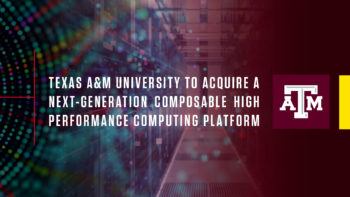NSF Grant Supports Texas A&M’s Acquisition Of High Performance Computing Platform

New funding from the National Science Foundation (NSF) will allow Texas A&M University to acquire a next-generation composable high performance computing platform to enable researchers to make transformative advances in a wide range of scientific fields, the Division of Research announced today.
With the support of an NSF Major Research Instrumentation (MRI) grant of $3.09 million, Texas A&M’s High Performance Research Computing (HPRC) will purchase FASTER (Fostering Accelerated Scientific Transformations, Education and Research), a composable high performance data-analysis and computing instrument. FASTER will significantly benefit scientific fields that rely on artificial intelligence and machine learning (AI/ML) techniques, big data practices and high performance computing (HPC) technologies.
These fields include the development of AI/ML models, cybersecurity, health population informatics, genomics, bioinformatics, computer-aided drug design, agricultural sciences, life sciences, biophysics, oil and gas simulations, materials science, climate modeling, multi-scale simulations, quantum computing architectures, biomedical imaging, geosciences and quantum chemistry.
“This is an important addition to our already impressive capabilities in high performance research computing,” said Vice President for Research Mark A. Barteau. “Computational science has become the ‘third pillar’ of research and scientific investigation and is essential for advanced theory and experimentation. In this age of groundbreaking, multidisciplinary research, it is vital for a world-class institution like Texas A&M to offer researchers access to the paradigm-changing power of high-speed computation and data analysis.”
Texas A&M will provide cost sharing of more than $1.32 million toward the project, which will be used to support researchers to effectively use this novel HPC/AL/ML platform.
“Congratulations to HPRC and the project team for securing the federal funding for this vital addition to our computing capabilities,”said Senior Associate Vice President for Research Costas N. Georghiades. “Research workflows in an ever-growing number of scientific and engineering disciplines are becoming more and more reliant on high performance computing to pursue pioneering discoveries and innovations. We are proud to expand and extend this capacity to our outstanding researchers across the A&M System.”
In addition, 30 percent of FASTER’s computing resources will be allocated to researchers nationwide by the NSF’s Extreme Science and Engineering Discovery Environment (XSEDE) program. The platform also will contribute to code development, education and the workforce-development goals of the NSF advanced cyberinfrastructure ecosystem.
“This unique HPC/AI/ML platform delivers much desired composability-features that go beyond the scope of the current generation of deployed supercomputers,” said HPRC Director Honggao Liu, who serves as the principal investigator (PI) for the FASTER project. “The FASTER platform will help researchers nationwide seek answers to questions that are currently intractable.
“The FASTER platform removes significant bottlenecks in research computing by leveraging a technology that can dynamically allocate resources to support research workflows. FASTER combines the innovative composable software-hardware approach with cutting-edge technologies such as next-generation central processing units (CPUs) and graphic processing units (GPUs), state-of-the-art Non-Volatile Memory Express (NVMe)-based storage and high-speed interconnect. Workflows on FASTER will dynamically integrate GPUs and NVMe to compose a single node, allowing them to scale beyond traditional hardware limits. This will allow researchers to use resources far more efficiently and to conduct more research in less time.”
Co-PIs for the project are Raymundo Arroyave, professor, Department of Materials Science & Engineering, jointly operated by the colleges of science and engineering; Dilma Da Silva, professor, Department of Computer Science & Engineering, College of Engineering; and Zhe “Sarina” Zhang, assistant professor, Department of Geography, College of Geosciences.
Media contact: Honggao Liu, 979-845-2561, honggao@tamu.edu





